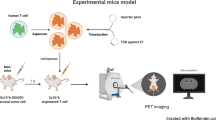Abstract
We previously reported that administration into mice of mouse lymphoid leukemia L1210 cells engineered to secrete macrophage colony-stimulating factor (M-CSF) could lead to tumor rejection. Here, we demonstrate that inoculation with irradiated M-CSF-producing cells protects mice against a subsequent challenge with unmodified parental tumor cells. We used 2 experimental protocols: the inoculation with irradiated M-CSF-producing L1210 cells (EM5) before the challenge with parental cells and after the challenge with parental cells. Both protocols effectively improved the survival rate of mice compared with protocols in which irradiated non-M-CSF-producing L1210 cells (EM-mock) were inoculated. Inoculation with 1 X 102 irradiated EM5 cells was sufficient to prolong the survival time of mice subsequently challenged with 1 X 104 parental cells. In vivo depletion experiments with administration of antibodies suggested the involvement of CD4+ T cells, CD8+ T cells, and natural killer (NK) cells in the antitumor effect. Consistent with these findings, the cytotoxic T lymphocyte activity of splenocytes from EM5-inoculated mice was higher than that from EM-mock-inoculated mice, and L1210 tumors were heavily infiltrated by CD4+ T cells and NK cells as well as macrophages in EM5-inoculated mice.
Similar content being viewed by others
References
Motoyoshi K. Biological activities and clinical application of MCSF.Int J Hematol. 1998;67:109–122.
Stanley ER, Heard PM. Factors regulating macrophage production and growth.J Biol Chem. 1977;252:4305–4312.
Wong GG, Temple PA, Leary AC, et al. Human CSF-1: molecular cloning and expression of 4-kb cDNA encoding the human urinary protein.Science. 1987;235:1504–1508.
Sagone AL Jr, Rinehart JJ. Human monocyte to macrophage differentiation in vitro: characterization and mechanisms of the increased antibody-dependent cytotoxicity associated with differentiation.J Leukoc Biol. 1984;35:217–228.
Suzu S, Yokota H, Yamada M, et al. Enhancing effect of human monocytic colony-stimulating factor on monocyte tumoricidal activity.Cancer Res. 1989;49:5913–5917.
Mufson RA, Aghajanian J, Wong G, Woodhouse C, Morgan AC. Macrophage colony-stimulating factor enhances monocyte and macrophage antibody-dependent cell-mediated cytotoxicity.Cell Immunol. 1989;119:182–192.
Wing EJ, Ampel NM, Waheed A, Shadduck RK. Macrophage colony-stimulating factor (M-CSF) enhances the capacity of murine macrophage to secrete oxygen reduction products.J Immunol. 1985;135:2052–2056.
Stuehr DJ, Nathan CF. Nitric oxide: a macrophage product responsible for cytostasis and respiratory inhibition in tumor target cells.J Exp Med. 1989;169:1543–1555.
Douzono M, Suzu S, Yamada M, et al. Augmentation of cancer chemotherapy by preinjection of human macrophage colony-stimulating factor in L1210 leukemic cell-inoculated mice.Jpn J Cancer Res. 1995;86:315–321.
Warren MK, Ralph P. Macrophage growth factor CSF-1 stimulates human monocyte production of IFN, TNF, and colony stimulating activity.J Immunol. 1986;137:2281–2285.
Sampson-Johannes A, Carlino JA. Enhancement of human monocyte tumoricidal activity by recombinant M-CSF.J Immunol. 1988;141:3680–3686.
Moore RN, Oppenhein JJ, Farrar JJ, Carter CS, Waheed A, Shadduck RK. Production of lymphocyte-activating factor (IL-1) by macrophage activated with colony-stimulating factors.J Immunol. 1980;125:1302–1305.
Oster W, Brach MA, Gruss HJ, Mertelsmann R, Herrmann F. Interleukin-1β (IL-1β) expression in human blood mononuclear phagocytes is differentially regulated by GM-CSF, M-CSF, and IL-3.Blood. 1992;79:1260–1265.
Agha-Mohammadi S, Lotze MT. Immunomodulation of cancer: potential use of selectively replicating agents.J Clin Invest. 2000;105:1173–1176.
Bock SN, Cameron RB, Kragel P, Mulé JJ, Rosenberg SA. Biological and antitumor effects of recombinant human macrophage colony-stimulating factor in mice.Cancer Res. 1991;51:2649–2654.
Schmidt-Wolf G, Schmidt-Wolf IGH. Cytokines and clinical gene therapy.Eur J Immunol. 1995;25:1137–1140.
Dranoff G, Mulligan RC. Gene transfer and cancer therapy.Adv Immunol. 1995;58:417–454.
Colombo MP, Rodolfo M. Tumor cells engineered to produce cytokines or cofactors as cellular vaccines: do animal studies really support clinical trials?Cancer Immunol Immunother. 1995;41:265–270.
Dorsch M, Hock H, Kunzendorf T, Blankenstein T. Macrophage colony-stimulating factor gene transfer into tumor cells induces macrophage infiltration but not tumor suppression.Eur J Immunol. 1993;23:186–190.
Walsh P, Dorner A, Duke RC, Su LJ, Golde LM. Macrophage colony-stimulating factor complementary DNA: a candidate for gene therapy in metastatic melanoma.J Natl Cancer Inst. 1995;87:809–816.
Kimura F, Douzono M, Ohta J, et al. Augmentation of antitumor immunity using genetically M-CSF-expressing L1210 cells [letter].Exp Hematol. 1996;24:360–363.
Morita T, Ikeda K, Douzono M, et al. Tumor vaccination with macrophage colony-stimulating factor-producing-Lewis lung carcinoma in mice.Blood. 1996;88:955–961.
Yoshioka H, Hama S, Sadatomo T, et al. Transformation of rat glioma cells with the M-CSF gene inhibits tumorigenesisin vivo.J Neurooncol. 1988;3:197–204.
Mizushima S, Nagata S. pEF-BOS, a powerful mammalian expression vector.Nucleic Acids Res. 1990;18:5322.
Kimura F, Suzu S, Nakamura Y, et al. Structural analysis of proteoglycan macrophage colony-stimulating factor.J Biol Chem. 1994;269:19751–19756.
Suzu S, Hatake K, Ota J, et al. Identification of alternative spliced transcripts encoding murine macrophage colony-stimulating factor.Biochem Biophys Res Commun. 1998;245:120–126.
Suzu S, Kimura F, Ota J, et al. Biologic activity of proteoglycan macrophage colony-stimulating factor.J Immunol. 1997;159:1860–1867.
Oshikawa K, Shi F, Rakhmilevich AL, Sondel PM, Mahvi DM, Yang NS. Synergistic inhibition of tumor growth in a murine mammary adenocarcinoma model by combination gene therapy using IL-12, proIL-18, and IL-1β converting enzyme cDNA.Proc Natl Acad Sci U S A. 1999;96:13351–13356.
Author information
Authors and Affiliations
Corresponding author
About this article
Cite this article
Suzu, S., Kimura, F., Tanaka-Douzono, M. et al. Antitumor Immunity Induced by Irradiated Tumor Cells Producing Macrophage Colony-Stimulating Factor. Int J Hematol 73, 378–382 (2001). https://doi.org/10.1007/BF02981965
Received:
Revised:
Accepted:
Published:
Issue Date:
DOI: https://doi.org/10.1007/BF02981965




